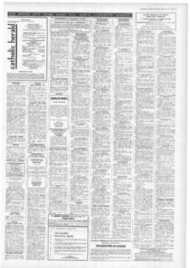Page 1, 23rd September 1966
Page 1

Report an error
Noticed an error on this page?If you've noticed an error in this article please click here to report it.
Tags
Share
Related articles
Ottaviani 'like Old Policeman
Mystery Of The Silenced U.s. Priest Deepens
The Attack On The Curia
Six Are Leaving The Curia
Revising Structure Of' Church
CARDINAL OTTAVIANI FEARS ABUSES
HE "Old Policeman" of the Vatican Curia, as controversial Cardinal Ottaviani once described himself, has been taking a stern look at Post-Vatican Council doings and finding them far from satisfactory (writes Alan. McElwain).
In a circular letter to Catholic bishops and heads of religious orders throughout the world the 75-yearold prelate has referred to "abuses in interpretation" of Council decisions and to the emergence of -strange and audacious opinions" which bewilder many Catholics.
With Pope Paul's approval. Cardinal Ottaviani has invited bishops at episcopal conferences in their own countries to discuss 10 "cases" which, he
says, concern "inexact" opinions on the inspiration and invulnerability of the Bible and the value of historic texts. These he says, are detrimental to Catholic dogma and the basis of Catholic Faith.
CHRISTMAS DATE The bishops are to report back to the Congregation for the Doctrine of the Faith (formerly the Holy Office) which Cardinal Ottaviani heads. by Christmas.
The Cardinal is particularly anxious about abuses in the interpretation of "ecumenism" which involves approaches to non-Catholics. Abuses are understood to include the condemnation by some Catholics of the ecumenical movement because, they claim. it has been responsible for a considerable drop in conversions to Catholicism.
The critics blame the Council for creating a "why should we change our religion now when soon well all be the same, anyhow" philosophy among many Anglicans and others, who before the Council, were regarded as certain to "come over".
CONE TOO FAR it has also been held that some "modern" theologians like Dr. Hans Kong, have gone too far in advocating a sort of "Don't let us be beastly to the Protestants" policy.
It is one thing, the traditionalists say, to avoid as much as possible over-emphasising points of dissension but quite another to adopt a "keep Catholic doctrines dark" line and hush up basic Catholic beliefs so as not to offend or alienate non-Catholics.
Cardinal Ottaviani's letter also touches on the controversy over original sin and evolution, which was the subject of a meeting of theologians near Rome on July 11.
At that time Pope Paul made an address which he later permitted to be substantially modified after the theologians protested that it was "too conservative" and closed the door to further consideration of the matter.
This meeting was first suggested to the Pope. by Fr. Edward Dhanis, S.J. Rector of the Gregorian University. It represented an important link in a chain of study which dates back to the 1940s when new discoveries caused scientists to tend more strongly toward the theory of polygenism — that mankind is not descended from a single common parent. When theologians began to hear about the unpublished writings of Fr. Pierre Teilhard de Chardin, the French Jesuit paleontologist, the controversy increased.
Especially in France, theologians speculated as to what effect such findings would have on the traditional account that Adam, the first man, brought loss of grace upon all his descendents by his first sin in the Garden of Eden.
After Pope Pius XII spoke out strongly against such speculations in his encyclical Human; Generic' (False Trends in Modern Teaching) in 1950, the theologians remained more or less silent until the late 1950s. After Teilhard's death new writings on original sin began to appear in professional journals—a fact which is still alarming conservatives in the Vatican.
There have also been attempts in some Catholic quarters to break down the doctrine of "transubstantia tion" and the "real presence of Christ in the Eucharist."
This, along with the veneration of the Virgin Mary has been one of the main stumbling blocks to non-Catholic understanding.
"Quite a number of the Catholic clergy are using the Vatican Council as the excuse for spreading an 'anything goes' mentality in the Church," a Vatican spokesman said. "But it is this mentality, damaging to both Catholics and the separated brethren, which Cardinal Ottaviani, on behalf of Pope Paul, aims to correct.
blog comments powered by Disqus









